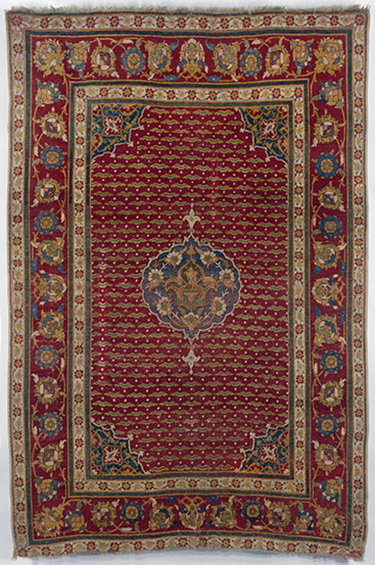It is interesting to know that this practice was derived from traditional talims used for making kani shawls when the shawl weavers turned to carpet weaving they continued the practice the finest carpets of kashmir are made of silk warp and pile.
Islamic carpet weaving in 1500.
Carpet weaving book covers in islam carpets and rugs are used for praying and are considered a furniture element of paradise.
At the beginning they used islamic designs in painting and tiling but gradually it find its role in carpet weaving.
Carpet weaving is the most iconic islamic art form to come out of islamic societies.
The art of carpet weaving was particularly important in the ottoman empire.
Although the patterns on islamic carpets have no specific meanings they do reflect a specifically muslim worldview.
A navajo rug with little spirit lines woven into the fabric.
Rugs are often decorated with elaborate designs incorporating.
Carpets are woven works of art that were produced at every level of society in the islamic world.
The simonetti carpet is commonly called a five color mamluk.
Carpet weaving in the safavid era.
The spirit line allows this trapped part of the weaver s spirit to safely exit the rug.
Women have been weaving for centuries in villages and nomadic encampments all over the middle east anatolia and central asia each woman passing down her techniques and designs to her daughters.
Carpet weaving is an important tradition in islamic culture.
The simonetti carpet the conventional practice of naming islamic carpets either after the place they were found niğde carpet or after a previous owner anhalt carpet in this case memoralizes the former italian owner of this magnificent example of fifteenth century cairene weaving under the burji mamluk dynasty 1382 1517.
Starting in the 16th century the safavid ottoman and mughal dynasties transformed carpet weaving which until then was a cottage industry based in small villages into a fine art and major export to europe and asia.
The ottoman state was founded by turkish tribes in.
Carpet weaving in the islamic world.
The most important textile produced in medieval and early modern islamic empires was the carpet.
Carpets are very popular among islamic countries and are considered objects of everyday life regarded with both esteem and admiration.
A kind of carpet weaving design that combines spiral curves with short branches of flowers and leaves.
The ottoman empire and carpet production.
This extraordinary tradition is most famous for producing the pile carpet also known as the oriental carpet and so predominantly you will find the most sophisticated islamic art in antique rugs.






























